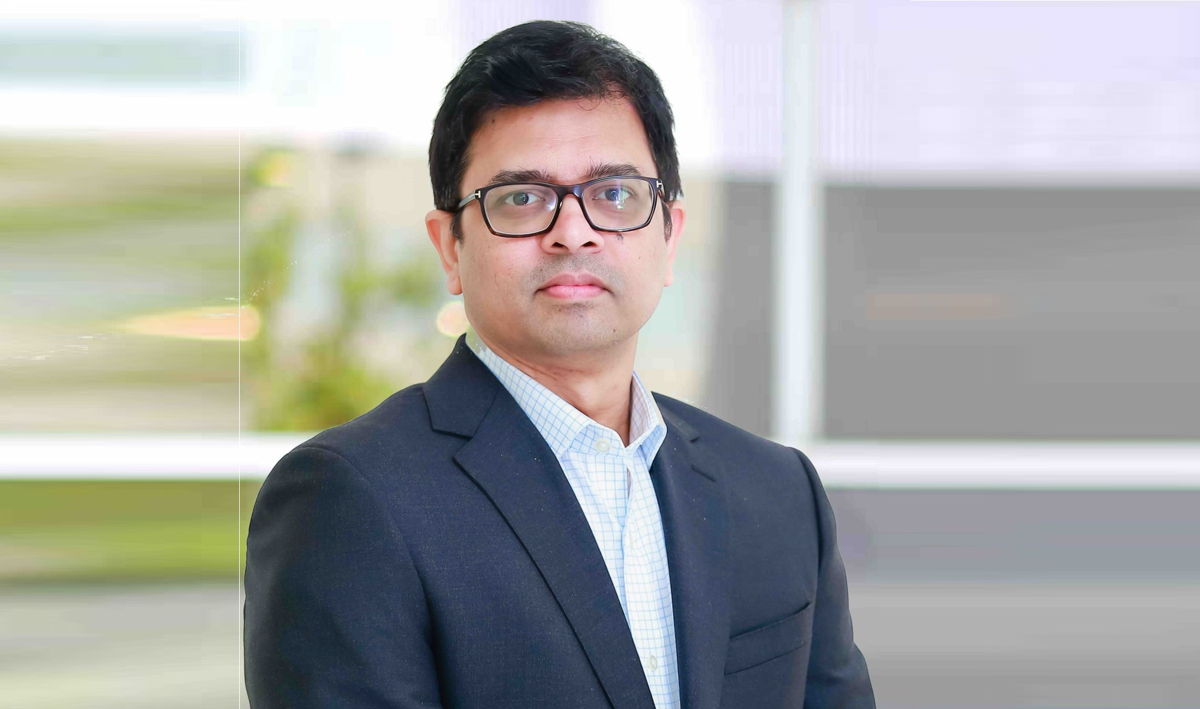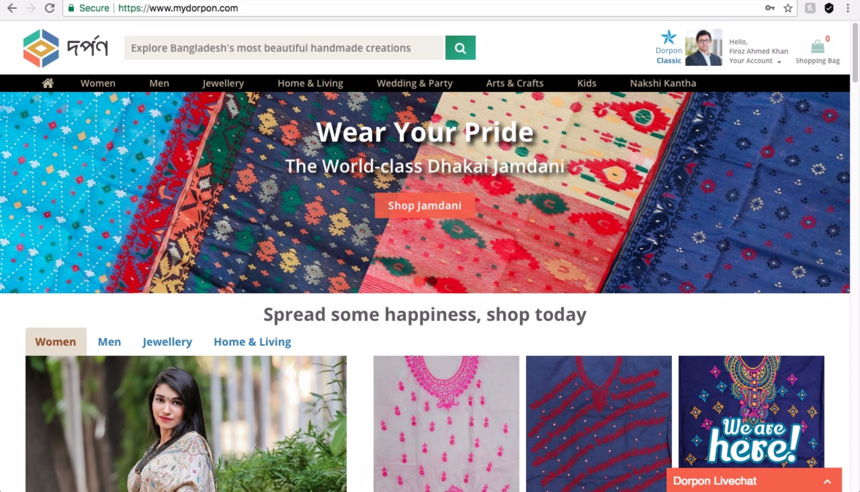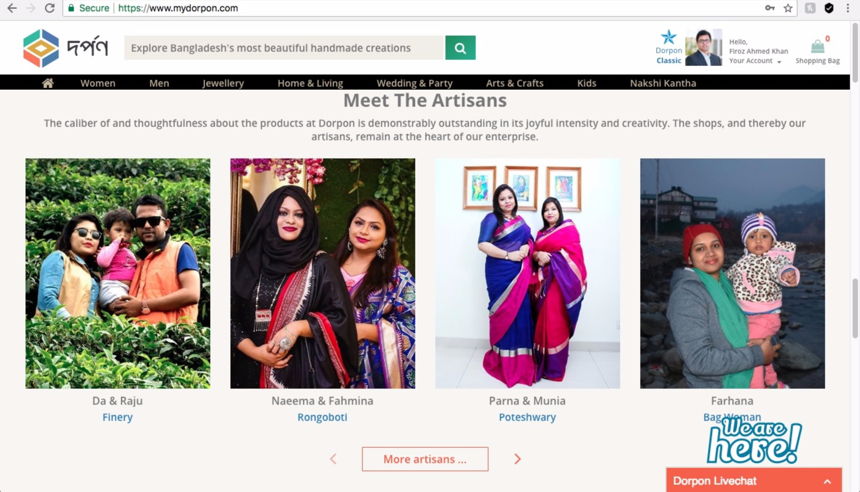
Dorpon CEO Firoz A Khan on his journey to entrepreneurship and Dorpon’s ambition to empower artisans and creative entrepreneurs in Bangladesh and the business of crafts.
Future Startup
Please tell us about your background and what you are working on now.
Firoz A Khan
I completed my secondary and higher secondary education from Mirzapur Cadet College. In 1991, I got admitted to Indian Institute of Technology in Madras, India and graduated with a degree in Aerospace Engineering. Most of my contemporary Bangladeshi students who went to India to study in this field didn't come back as there was little opportunity for them in the country. They either went to more developed countries to build a desirable career or opt for higher studies in India. But, for familial reasons, I had to come back to Bangladesh and began searching for jobs. At one point, I got an offer from Techno Heaven which was, at that time, working with Bangladesh Railway in building the e-ticketing system. That’s where I started my career.
While working at Techno Heaven, I was also exploring other opportunities. After a while, I came to know the demand for MBA degree in the market, particularly of IBA, Dhaka University. I realized that I needed to do an MBA in order to get a more suitable job. So, I left Techno Heaven and enrolled in the master's program at the Institute of Business Administration (IBA) at University of Dhaka.
While at IBA, I also started a small independent business along with Yasir Azman, a close friend of mine who is now the Deputy CEO of Grameenphone and a few other friends which did not go far, of course.
Upon finishing my post-graduation from IBA, I applied for jobs in several companies. This time I was looking for something different. So, when I came to know about Ekushey Television's foray outside the typical network system, I was positively fascinated.
Instead of the satellite-based network, they were attempting to establish a terrestrial network. This network system uses antennae and communication towers to broadcast television programs across the region. It was a relatively new concept at that time. So, I joined ETV as a Management Trainee Officer and began working in a number of areas from the beginning including program management, logistics management, finance, and marketing.
Later on, I concentrated more on the company's finance department and used to coordinate with the banks. While working at the Ekushey Television, I met Abrar Anwar, former CEO of Standard Chartered Bank, Bangladesh, currently CEO of Standard Chartered Bank Malaysia. I used to collaborate with him on behalf of my organization. At one point, he offered me to join Standard Chartered Bank which eventually led to me joining StanChart Bangladesh and beginning of my Banking career.
I worked at StanChart bank for eight years, mostly in the finance department, and learned a great deal about banking. People who work in the lending and other departments in a bank usually learn the basic mechanism of banking operation like provisioning loans, accepting deposits and so on. But those who work in the finance get to have a bird's eye view of the entire operation. So, it helped me a lot.
Later on, I joined BRAC Bank as the Head of Retail operation. BRAC Bank was an emerging brand at that time. They had a consistent growth rate and were trying to bring in a new business model which particularly focused on small and medium enterprises (SME). I worked there for eight years and saw the company grow large.
During the end of my tenure at BRAC Bank, I felt the need to do something on my own. Unlike today's young people, the urge to found a company came to me a little late. But no matter how late, the urge kept growing inside me. Afterward, I sought consultancy from a dear friend of mine, Shariful Islam, Founder of Bangladesh Brand Forum. His story inspires me. Previously, he used to be the brand manager for Unilever Bangladesh. He was very successful at his job, but nevertheless left it at one point and opened his own business. And not to our surprise, his new company was a success as well.
So, we discussed and planned to do something in the financial industry. Traditionally, this industry is characterized by high-regulation and dominance of a few entities. Banks who have been the major players for a long time in the sector have never faced any competition from disruptive outside sources. Hence, there is a little place for innovation here. After the global financial crisis in 200X, Banks have concentrated more on risk management, cybersecurity, and whatnot, but shifted their focus away from improving customer service which, as a service business, should be their focal point.
So, our idea was to build a knowledge and innovation platform to help the finance industry grow. We formed a company called FinAction Bangladesh and we launched a platform called Financial Forum Bangladesh with an ambition to help the financial industry grow. We arranged some programs and organized training events. But building a platform is a challenging affair and it takes time. And if you are working in the financial industry which is a highly regulated industry where there is no pressure for change and innovation, it is even harder to break into. While working on the Financial Forum, I came across an opportunity at LankaBangla Finance and joined there as Deputy Managing Director. But the itch inside me of doing something of my own was there and growing.
After a while, I again felt the need to build something on my own. The urge this time was stronger. I gathered my former partners and this time we decided to work on a more root level. That eventually led to the founding of Finova Technologies Limited - a company that aims to build fintech solutions.

Future Startup
That’s a fascinating story. How did you end up starting Dorpon?
Firoz A Khan
As I said, when we started Finova, our goal was to build financial technology solutions. But once we started working, we came to find that it is difficult to build many of these solutions due to several challenges including regulatory ones which eventually led to the founding of Dorpon, which is not a financial product at its core but has several components that could facilitate build fintech solutions in the future.
We decided that we would build an e-marketplace that would be selling handcrafted products made by rural artisans.
Our idea is unique in the sense that we are facilitating collaboration with these craftsmen and connecting artisans with customers directly without any middleman and in the process helping these artisans to earn the fair price for their products. We believed that if these two groups meet in a single platform, scaling up businesses would be much easier for the artisans and it would unleash a bounty effect where customers will get better products and artisans will be able to make better products.
So, essentially, Dorpon is an online marketplace which connects artisans, craftsman and creative entrepreneurs with the customers and enables both parties to have a win-win relationship.
Despite the fact that there is a huge market for crafts and artisan products, artisans often struggle to survive and build a meaningful career. We hope our platform will help artisans to earn the fair price for their products.
Future Startup
There is a need for an online platform for craft and artisan products and the problem that you just mentioned is a real one. How do you work with the artisans? Since you are a platform you earn from commission you get from successful transactions on your platform. How does that, your business model, work?
Firoz A Khan
Simply, we are an open platform where artisans can come and open shop and start selling. There is a process, of course, we can’t allow anyone and everyone without proper verification but we try to make the process friendlier for our artisan partners.
Once you have a shop at mydorpon.com, you can start taking orders. We also provide logistics facility to ensure better customer experience. We are currently in talks with multiple logistics partners who can give us nation-wide logistics support. Since our artisans are based in different remote parts of the country, it is critical for us to ensure that.
Moreover, for those who are not tech-savvy, we also assist them in properly showcasing their products online. For instance, we have a photography studio where we invite our producers and photograph their products to display them on the website. And, we are doing it free-of-cost. Apart from that, we provide other supports to artisans to grow their business and plan to offer more support as we go.
Our business follows a pay-as-you-go model, i.e. we do not charge merchants any fixed amount. Opening a shop at Dorpon is completely free. We take a commission from every sale at rates ranging from 15% to 18%. Against that, our entrepreneur partners receive all the values that I have mentioned.
If you look at a typical supply chain in Bangladesh, you'll notice that the producers only get 20% of the value and the rest is consumed by the intermediaries. This is a painful reality for our rural artisans too.
Take, for example, original Jamdani sarees made in the Jamdani Palli. Many companies now are buying sarees from this crafts-house and selling them at higher prices to high-end customers but the artisans don’t get any share of this entire transaction. This is where we come in. We want to ensure that these artisans receive the appropriate value for their craftsmanship. Our commission rates are determined bearing all that in mind.

Future Startup
Could you please give us an overview of the company?
Firoz A Khan
We just soft launched our platform. The online platform has just launched and we are seeing a slow adoption both on merchants and customers end.
Currently, there are over 100 artisans in our platform offering a host of handmade crafts and other products. We expect the list to grow considerably throughout the year. We have laid out the groundwork. There are some more works to be done. But on the artisans' side, we are receiving a good response. We have also built a system that I hope will help us to increase the number of artisans dramatically.
At this beta-stage, we are receiving only a nominal number of orders. There are still some preparations to make like the integration of the payment process which we are doing with SSL Wireless. As soon as we are ready, we would push for customer acquisition. Currently, whatever orders we have are mostly organic in nature.
As a private limited company, we have an active board and we conduct board meeting every month where we review our preceding performance.
Future Startup
How do you onboard new suppliers, artisans in your case?
Firoz A Khan
Finding and taking new artisans aboard is actually pretty challenging process. Often we need to visit remote regions to find new artisans hubs. We have made several visits to different parts of the country to onboard merchants.
We have found out that most NGOs working in Bangladesh have connections with these local artisans in their respective areas. Many of the local NGOs work with local artisans. We have established collaboration with these NGOs so that we can use their network and find our suppliers.
In Kushtia, we have communicated with craftsmen with the help of an organization called SETU; in Jessore, there is USS. We are also talking with NGOs in Rangamati, Satkhira and some other places to get in touch with the artisan community there. In doing so, there is a two-fold benefit: we can use their fairly vast network; and second, in the absence of our own brand value right now, their goodwill helps us to gain suppliers' trust.
Even with the collaboration with the NGOs, it's still a lengthy and resource-demanding process. This is why we plan to train at least one individual from our local partner NGO in every region we operate who will basically look after the operation and carry out key responsibilities, such as--uploading latest product specifications, order management and so on.
Future Startup
What went into building the operation?
Firoz A Khan
Initially, we have started with our own investment. After a while, we had invited investments from angel investors. And, surprisingly, we have raised a good amount in angel investment that should give us a good runway and test the market.
Besides that, our business model has also caught the attention of some venture capital firms who have shown interest. However, we are not thinking of raising more money at this point in time.
We are still a fairly small team with six members at present. All of them are highly-qualified, energetic person. We are fortunate to have people with us who know the mechanisms of business operations and can save us the costs of failures.
Apart from our operations team, we have a small tech team that takes care of our technological development works.
Future Startup
What are the major challenges for Dorpon now and as well going forward down the line a few years?
Firoz A Khan
The key challenge, in my opinion, will be to popularize our business model to artisans and creative entrepreneurs. Most artisans still are not familiar with the idea of e-commerce. Rather they dream of a physical shop where people would come to buy her/his product and so on.
We are, in fact, doing the same thing but due to a brand new medium, they find it a bit difficult to get accustomed to our digital platform. This is a challenge. It will require some time to overcome this. We are investing in education and putting together pieces in place to make this transition smooth for our artisan partners.
The other challenge is educating the artisans. Many of these artisans maintain a wholesale business model. And their pricing is designed accordingly. Since we are trying to turn our suppliers from wholesaler to retailer, pricing has become an issue. Their pricing strategies are not always beneficial either for us or for themselves. So, to provide them with a retailer's perspective is a challenge at times.
The quality and design of the products is also a concern. If we want to tap into the high-end market, sooner or later they will demand more sophisticated products. The craftsmen, in this regard, seem to lack knowledge of quality improvements like of design, color, and fabric. To make them aware of it we need to train them which means additional investment. From the very beginning, we realized that we would require investing in design - helping artisans with designs and related stuff. But it is not easy to implement. We are exploring options. In fact, Government can help us in this regard by providing some training to these artisans in order to make them more skillful.
These are some of the challenges we see. Having said that, there will always be challenges. Addressing these challenges is our job.
Future Startup
What are the plans going forward?
Firoz A Khan
During the remaining of this year, improving our platform is a priority. Making the experience seamless for both the users/merchants and the customers. You will also see a few new features.
Our mobile app is also in the making. Mobile continues to play an important role in digital shopping. Many people predict that mobile is the next growth frontier. Soon you will see our mobile app.
At the outset of next year, we will attempt to build a craft-centers (training centers for craftsmen) across the country and customer experience centers for customers to come, experience and order our products if everything goes well.
Right now, our main focus is on providing quality service to our customers. The platform is growing daily. New merchants are joining. Slowly customers are placing orders. As we push growth, ensuring superior shopping experience will always get precedence.
-
Want to learn more about Dorpon?
You can go to mydorpon.com to learn more, open a shop or buy artisan products. Dorpon also publishes interesting stories on artisans on the dorpon blog which you can check here.
Starting your own business or have queries or tips to share about startup and entrepreneurship?
You should join Future Startup Community and subscribe to our weekly newsletter. FS Community is an online forum for entrepreneurs and makes to discuss topics related to entrepreneurship and technology, ask questions, share products, learn and connect with other founders. Come share what you are working on and meet with other peers and help each other to grow.
If you are not building anything yet, no problem. We have great stories, brilliant interviews on and with makers and brilliant minds, just browse.
-
Interview By Ruhul Kader, Transcription Rahatil Ashekan
